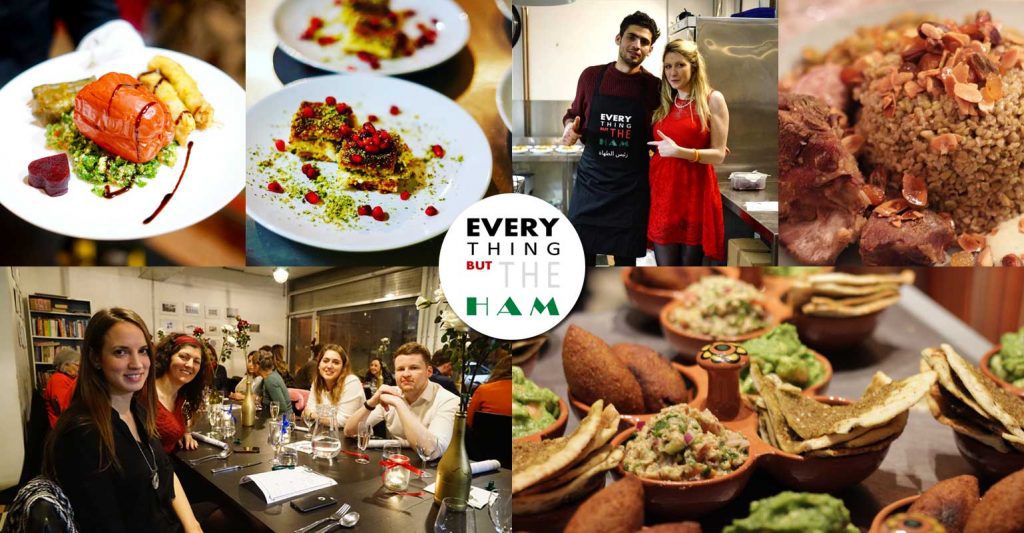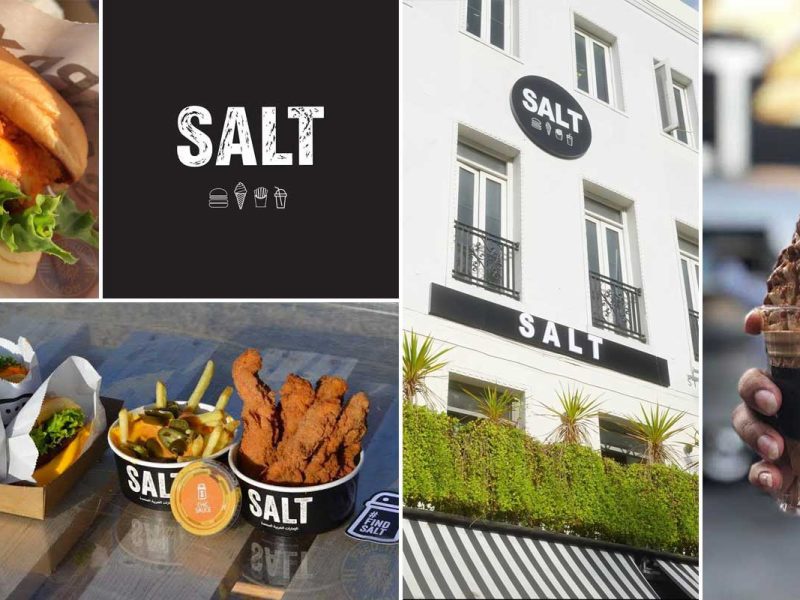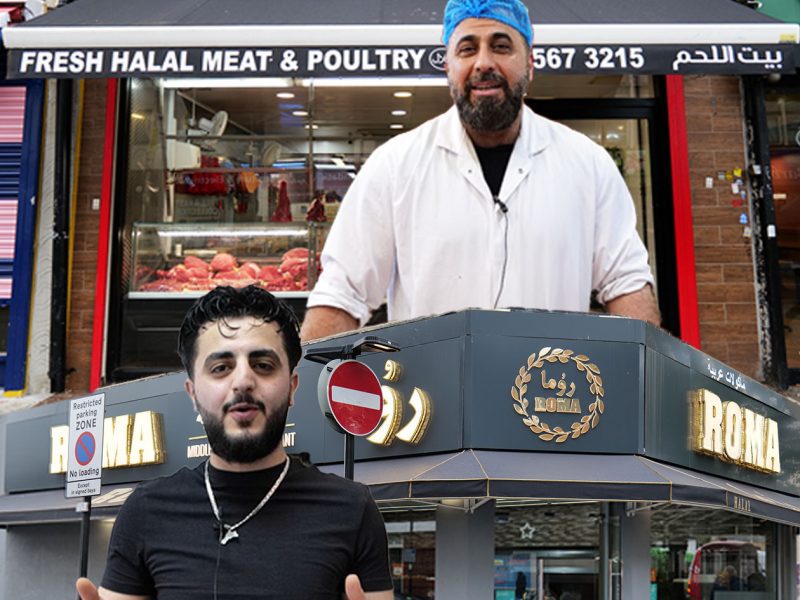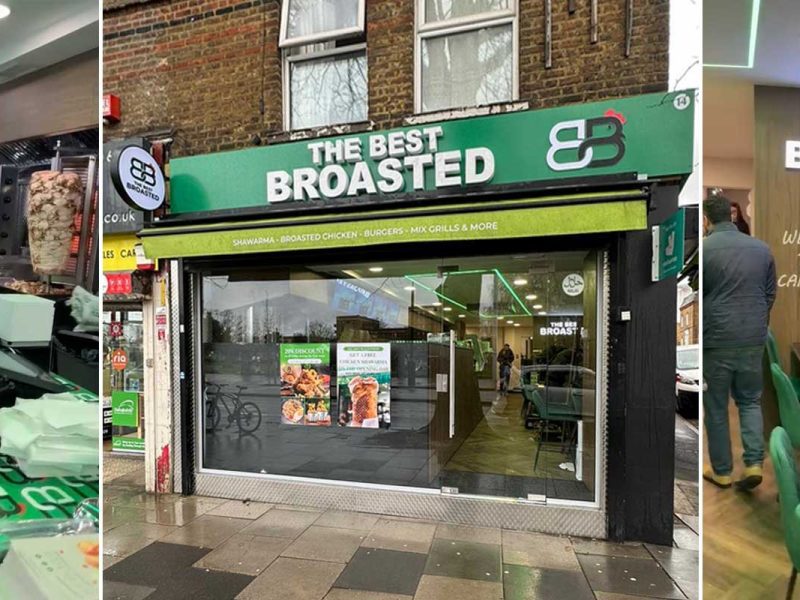Palestinian food pop-up Everything But The Ham
Palestinian culture revolves around food, from day to day life to weddings and celebrations – food comes into every aspect. – Mohammed
How many food pop-up companies do you know of that “transport traditional homemade food from the kitchens of Gaza straight to your fancy dinner plate in London”?
Everything But The Ham is one such business that’s quickly making a name for itself with carefully themed food events, where all the meat is “100% Halal”, that mainly revolve around the sensitive issue of Palestinian while raising funds and awareness for the people of Gaza.
Run by husband and wife duo Mohammed Qeshta and Amy Jackson, Mohammed (or Hams as he’s affectionately called by his other half) is a chef originally from the Gaza Strip, and Amy an award-winning artist working in environmental and social sustainability.
The couple launched Everything But The Ham last year as an entertainment and events brand “specialising in experiential dining” that would leave diners “feeling satisfied and puzzled at the same time” by “blurring the lines between conceptual art and entertainment”.
And Mohammed and Amy are combining their skills as a chef and as an artist for their next pop-up event on 21 April called ‘Water Blues?’ where a 3-course traditional Palestinian meal will be served, with all proceeds raised going to Human Appeal’s Clean Water appeal.
FtL caught up with the couple to find out more about their unique venture.
When it came to Palestine, I wanted to raise awareness about the situation there through ways in which people were open to engage. Palestine really is a conflict for the activist. – Amy
FtL @Amy: As an artist Amy, you’ve said that Palestine is an important topic for you and that you use your creativity as “a sort of art activism”. Can you elaborate on what you mean?
Somewhere in the midst of falling out of love with the art world and falling in love with my now husband, I decided to engage with Palestine, and specifically the Gaza Strip, as a subject for my latest body of work.
I had two very distinct purposes for using my creativity as an art activist. First of all, I wanted to make work that was about more than just the art world; and secondly, I feel very passionate about crucial, global issues people are either ignorant of or choose to ignore.
When it came to Palestine, I wanted to raise awareness about the situation there through ways in which people were open to engage. Palestine really is a conflict for the activist. It is an issue either misunderstood by the masses, manipulated by the media, or simply never told. One truly has to go out of their way to undercover what is actually happening over there. No one wants to be preached at about sad things on a Saturday, and Prime Ministers play illiterate when it comes to placards. My opinion – after 70 bloody years, there has to be a better way to send a message.
FtL @Mohammed: Do you have one particular dish which never fails to bring back cherished memories of home in Palestine, and why does it evoke such strong nostalgia?
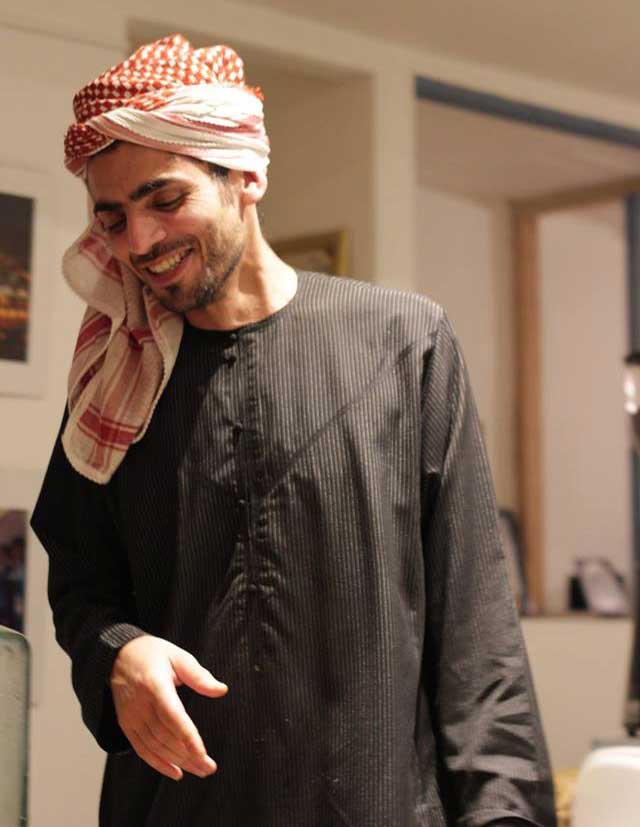
Mohammed Qeshta (above), or Hams as he’s affectionately called by his wife, Amy Jackson. (Credit: Russell Gundry)
Yes! Mahshi is a mighty Gazan traditional dish. This meal is mainly eaten in winter and springtime. It is usually served for special guests on special occasions. Families in Gaza tend to serve it to the bride and the groom at least once in the last few days prior to the wedding. This dish is composed of stuffed vegetables such as, baby aubergine, courgette, pumpkins, potatoes, carrots, red onions, marrows, as well as a variety of leaf vegetables such as grape and cabbage leaves. This meal requires delicacy and time, and that is why it is prepared before the day it is cooked and served.
This dish particularly evokes special nostalgia for me, because it reminds me of the golden family time we used to enjoy together as it normally requires all family members to participate in the rolling and stuffing of the vegetables, relaxing the amount of individual effort required, with great attention to detail.
FtL @Mohammed: Tell us a little more about Palestinian food. How does this compare with food from in and around the region? What aspects of Palestinian food are unique to Palestine?
Palestinian food includes a range of tasty dishes while sharing traits with Middle Eastern and the Mediterranean countries. However, in Palestine there is a great diversity of food which vary from season to season, street to home, city to village, coast to mainland, and even from north to south. Each area in Palestine has its own specialities and secrets; priding themselves on their quality of ingredients and individuality.
Within Galilee, you will discover a region famous for its olives, pomegranates and freshwater fish. The West Bank boasts heavier dishes, with lentils, meats and traditional breads.
The cuisine in Gaza is rich in seafood and spices, but also celebrates mouth-watering skewered meats and chilli peppers.
Palestinian sweet treats are world renowned, normally featuring pastries, sweetened cheeses, nuts and dates.
Meal times in Palestine are more than just about fuel and nutrition. Palestinian culture revolves around food, from day to day life to weddings and celebrations – food comes into every aspect. Its about spending time with family and friends and making an event out of the ordinary.
Another great thing about Palestinian food is that although meat is such an important part of most meals, they’re a very thrifty nation when it comes to making something delicious out of almost nothing. – Amy
FtL @Mohammed & Amy: What are both your top 3 Palestinian dishes, and why?
Amy: I literally can’t eat enough of Poor Man’s Gold. It’s a healthy, warming and addictive lentil soup. As an artist, you can imagine me growing up appreciating anything that could be made for 10p per portion.
Hams [Mohammed] first cooked me Malaha when I was feeling a little under the weather, and it is literally a miracle cure. Cucumber, dill, lemon juice, tomato, chillies, onion, ayran yoghurt and bread, all come together to make an addictively refreshing salad.
Anteel Salad is really a dip comprising of avocado and king prawns. Sadly, I don’t eat fish or meat anymore, but it’s amazing anyway, and I highly recommend it to anyone who likes life.
Another great thing about Palestinian food is that although meat is such an important part of most meals, they’re a very thrifty nation when it comes to making something delicious out of almost nothing.
Mohammed: Musakhan is the national dish of Palestine and it comprises a roasted baby chicken baked with onions, sumac, all-spice, saffron and fried pine nuts, and is normally served on or wrapped in a traditional Palestinian taboon wholegrain bread.
Maqluba (meaning upside down in Arabic) is a very popular communal dish in Palestine. It consists of meat, vegetables and rice layered together and cooked in one pot. When it’s ready, we flip it over on a big flat platter for the family and guests to enjoy.
Rummaneyye (meaning pomegranate-ish) is the most popular dish in Gaza especially during the pomegranate season. This spectacular dish mainly consists of pomegranate, cooked with lentils, aubergine and garlic.
FtL @Mohammed & Amy: Where would the two of you like to ideally open your first restaurant?
We would ideally like to open our first restaurant in the area of Shoreditch, Bethnal Green or Dalston. The reason for this is simply because these areas attract some of the most interesting residents and visitors who come from various backgrounds and who have the exact mind-set to explore different cuisines, meet other people in a new immersive atmosphere, and who, most importantly, are likely to have passion for supporting a noble cause like Palestine’s.
FtL @Mohammed: If there was one chef you’d like to work with one day, who would it be?
Joudie Kalla! I am very inspired by this Palestinian master chef and author of the cookbook ‘Memories from My Mother’s Kitchen’. She is my idol to some extent as she was the first Palestinian to not only master traditional Palestinian food-making, but she also bravely improvised on it to take Palestinian cuisine to a new level of competition.


